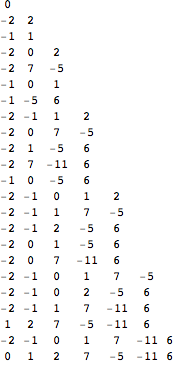Python (128 137 136)
Damn you, itertools.permutations, for having such a long name!
Brute force solution. I'm surprised it's not the shortest: but I guess itertools ruins the solution.
Ungolfed:
import itertools
initial_set=map(int, input().split())
ans=[]
for length in range(1, len(x)+1):
for subset in itertools.permutations(initial_set, length):
if sum(subset)==0:
ans+=str(sorted(subset))
print set(ans)
Golfed (ugly output):
from itertools import*
x=map(int,input().split())
print set(`sorted(j)`for a in range(1,len(x)+1)for j in permutations(x,a)if sum(j)==0)
Golfed (pretty output) (183):
from itertools import*
x=map(int,input().split())
print `set(`sorted(j)`[1:-1]for a in range(1,len(x)+1)for j in permutations(x,a)if sum(j)==0)`[5:-2].replace("'","\n").replace(",","")
import itertools as i: importing the itertools module and calling it i
x=map(int,input().split()): seperates the input by spaces, then turns the resulting lists' items into integers (2 3 -5 -> [2, 3, -5])
set(sorted(j)for a in range(1,len(x)+1)for j in i.permutations(x,a)if sum(j)==0):
Returns a list of all subsets in x, sorted, where the sum is 0, and then gets only the unique items
(set(...))
The graves (`) around sorted(j) is Python shorthand for repr(sorted(j)). The reason why this is here is because sets in Python cannot handle lists, so the next best thing is to use strings with a list as the text.


1Do we have to worry about uniqueness if the input contains non-unique numbers? In other words, how many results do I have to print for the input
3 3 -3 -3? – Keith Randall – 2012-10-10T04:03:06.527@Keith. By convention, sets consist of distinct elements that appear at most once. Multisets can have elements that appear more than once. http://en.wikipedia.org/wiki/Multiset
– DavidC – 2012-10-10T07:15:26.1034@DavidCarraher, OP mixes terminology by talking about subsets of lists. – Peter Taylor – 2012-10-10T07:18:57.457
@PeterTaylor Thanks. Good point. – DavidC – 2012-10-10T07:29:10.023